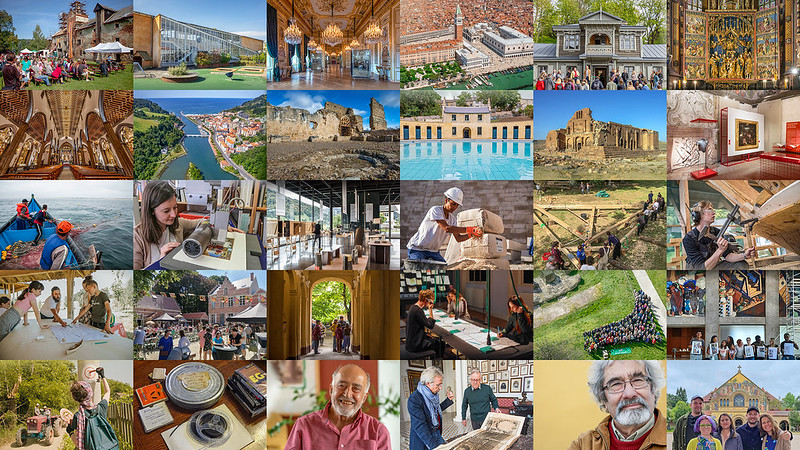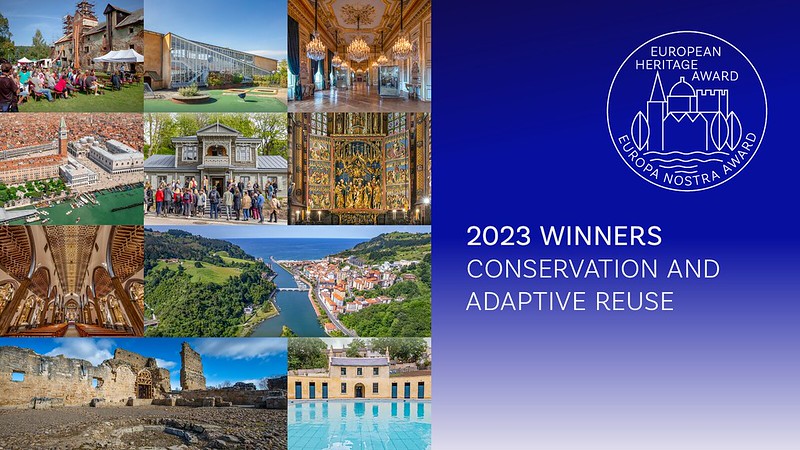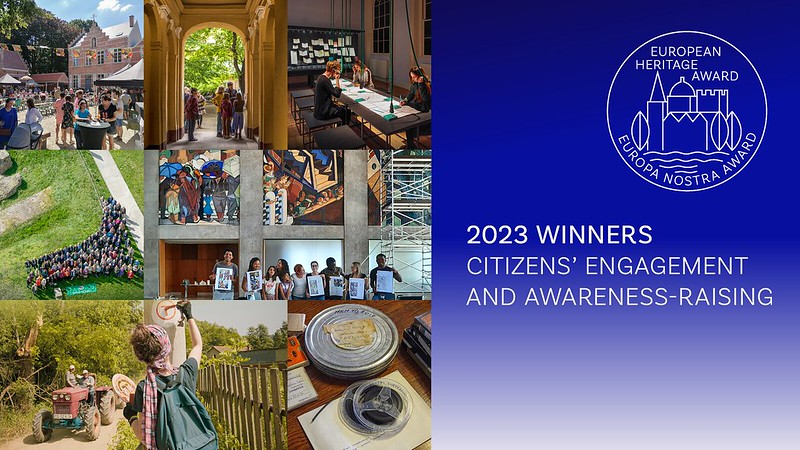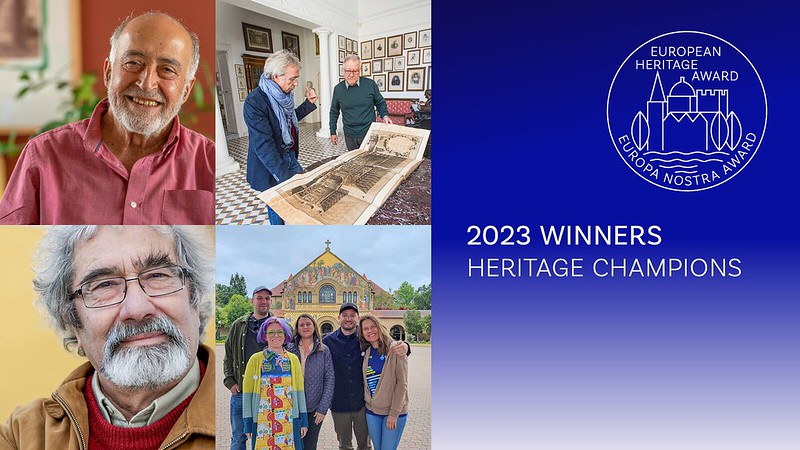2023 Winners of Europe’s top heritage awards announced by the European Commission and Europa Nostra
Brussels / The Hague, 13 June 2023
The European Commission and Europa Nostra have announced today the winners of the European Heritage Awards / Europa Nostra Awards 2023. This year, 30 outstanding heritage achievements from 21 countries have been awarded Europe’s top honour in the field (see the full list below).
The Awards, funded by the Creative Europe programme of the European Union, are granted in five categories: 1) Conservation & Adaptive Reuse; 2) Research; 3) Education, Training & Skills; 4) Citizens’ Engagement & Awareness-raising; and 5) Heritage Champions.
This year’s impressive collection of award winners ranges from the true renaissance of the Royal Gardens of Venice (Italy), a most treasured green space in the heart of this unique heritage city, to the fascinating research project Safeguarding of the Artisanal Fishing Technique “Arte-Xávega” (Portugal), which helps secure the future of one the last examples of artisanal and sustainable fishing in Europe; from ACTA VISTA (France), an innovative heritage skills training programme which helps individuals marginalised from employment return to work, to the annual festival Budapest 100 (Hungary), which celebrates the built heritage of this World Heritage City; and the transfrontier network of volunteers of SUCHO: Saving Ukrainian Cultural Heritage Online (Ukraine/International Project), which web archived over 50TB of data from Ukrainian cultural institutions in the first months of the war in Ukraine.
The Award winners were selected by the Jury, composed of heritage experts from across Europe, upon evaluation by the Selection Committees that are responsible for examining award applications, which this year were submitted by organisations and individuals from 35 European countries.
Reacting to the announcement of the 2023 winners, Margaritis Schinas, Vice-President for Promoting our European Way of Life, who is currently in charge of Culture, stated: “Each winning achievement of this year’s European Heritage Awards / Europa Nostra Awards is the result of extraordinary skills and commitment, collective and individual, spanning heritage places and traditions across Europe. By honouring these achievements, we also reiterate our firm commitment to protecting our shared cultural heritage, because it is vital for our sense of togetherness as citizens and communities of Europe.”
Cecilia Bartoli, the world-renowned mezzo-soprano and President of Europa Nostra, stated: “I warmly congratulate this year’s winners of the European Heritage Awards / Europa Nostra Awards on their well-deserved recognition. They are inspiring examples which truly contribute to building a more beautiful, sustainable and inclusive Europe. Their success stories demonstrate how adversity can be overcome through pooling expertise, dedication, creativity and innovation. I look forward to meeting them in person and celebrating all the winners at the European Heritage Awards Ceremony in our beloved World Heritage City of Venice”.
The winners will be celebrated at the European Heritage Awards Ceremony on 28 September in the Palazzo del Cinema in Venice. This prestigious event will be honoured with the participation of Cecilia Bartoli, President of Europa Nostra. Margaritis Schinas, Vice-President of the European Commission, is also expected to attend this high-level event. During the ceremony, the Grand Prix laureates and the Public Choice Award winner, chosen from among this year’s winners and entitled to receive €10,000 each, will be announced. The ceremony will be a highlight of the European Cultural Heritage Summit 2023, organised by Europa Nostra with the support of the European Commission, on 27-30 September in the World Heritage City of Venice.
Heritage supporters and enthusiasts are now encouraged to discover the winners and vote online to decide who will win the Public Choice Award 2023, entitled to receive a monetary award of €10,000.
From Norway to Portugal, from France to Ukraine: these are the winners of the European Heritage Awards / Europa Nostra Awards 2023*
Conservation and Adaptive Reuse
Steam Engine Brewery, Lobeč, CZECHIA
For over 15 years, the architects Jana and Pavel Prouza worked to revive this brewery with a rich history dating back to 1586. It was reopened with a mix of cultural and business activities to ensure its sustainability.
Friluftsskolen Open-Air School, Copenhagen, DENMARK
This masterpiece of functionalism, designed by the architect Kaj Gottlob and built in 1938, demonstrates the way in which architecture can contribute to health and well-being. Its restoration serves as a model for other schools in Europe.
Hôtel de la Marine, Paris, FRANCE
An extensive, high-quality project brought this mid-18th century building at the Place de la Concorde in Paris back to its original splendour, while creating a new cultural hub. The restoration is also notable for its innovative financing model.
Royal Gardens of Venice, ITALY
Following complex renovation works, these abandoned gardens from the Napoleonic-era have been given new life and their architectural link to St. Mark’s Square reinstated. Today, these gardens are a beautiful, ecologically sustainable oasis that can be enjoyed by everyone.
Museum of Urban Wooden Architecture, Vilnius, LITHUANIA
This 19th-century wooden building was restored using high-level craftsmanship and authentic techniques. It now houses a museum and community centre, serving as an example for other similar buildings in Vilnius and beyond.
Wit Stwosz Altarpiece in St. Mary’s Basilica, Kraków, POLAND
The altarpiece carved from 1477 to 1489 by Wit Stwosz, renowned German-born sculptor who moved from Nuremberg to Krakow, is widely regarded as a masterpiece of Gothic art. Its meticulous restoration, based on thorough research, was undertaken in situ for over 1,000 days and involved a team of top professionals from across Europe.
Mudéjar Ceilings of the Cathedral of Funchal, Madeira, PORTUGAL
The restoration of these rare Mudéjar style ceilings, covering 1500 m2, was carried out using the best practices in wood conservation and involved an interdisciplinary team of top professionals of various nationalities.
Deba Bridge, Gipuzkoa, SPAIN
The remarkable rehabilitation of this 19th-century stone bridge, an exquisite example of civil engineering, required extensive historical research into materials and forgotten techniques and benefitted from interdisciplinary technical cooperation.
Ruins of the Monastery of San Pedro de Eslonza, Gradefes, SPAIN
The ruins of this 16th-century monastery have undergone an intervention that included archaeological investigation, consolidation and rehabilitation for tourist visits. Its technical, economic and social sustainability is commendable.
Research
Scientific-Archaeological Studies for the Preservation of Ererouyk, ARMENIA/FRANCE
The Early Christian and Medieval complex of Ererouyk was researched with a scientific, multidisciplinary and environmentally progressive approach between 2009 and 2021 by experts of various nationalities.
Proto-Industrial Architecture of the Veneto in the Age of Palladio, ITALY
This three-year study of Veneto’s proto-industrial heritage is unprecedented in both Italian and European contexts. It provides insight into the history of innovation and the transfer of knowledge at a European level, focusing on the merits of hydraulic power.
Safeguarding of the Artisanal Fishing Technique “Arte-Xávega”, PORTUGAL
Through the transfer of knowledge and know-how, this research project showcases exemplary practices of safeguarding “Arte-Xávega”, one of the last examples of artisanal and sustainable fishing in the European Union.
Education, Training and Skills
MADE IN: Crafts and Design Narratives, AUSTRIA/CROATIA/SLOVENIA/SERBIA
This European platform brings together designers, researchers and curators, who are all dedicated to exploring heritage through contemporary production. It promotes the invaluable role of crafts in shaping local identities and ensuring the sustainability of communities.
ACTA VISTA, Marseille, FRANCE
Since its creation in 2002, this association has developed training projects in heritage trades, involving 5,000 individuals marginalised from the labour market. Its innovative approach, which combines training for vulnerable citizens, social support and a cultural dimension accessible to all, is unparalleled in Europe.
Carpenters without Borders, Paris, FRANCE
Since 1992, Carpenters without Borders have fostered a movement of wood carpentry professionals who volunteer their expertise on an international scale. A groundbreaking project showcases their ability to reconstruct the frame of the fire-ravaged Notre-Dame Cathedral using materials and techniques reminiscent of the 13th century.
National Centres for Restoration of Historic Vessels, NORWAY
These centres undertake significant work to preserve the skills related to the construction and repair of historic ships, an important element of Norway’s rich maritime heritage. This initiative stands out for its comprehensive approach, creating a wholesome experience that sets an impressive example for other countries in Europe and beyond.
Pathfinders of the Waters, Danube Delta, ROMANIA
This project targets villages along the Danube with limited access to cultural activities, using the traditional canoe (lotca) as a means to promote the value of local heritage and the acquisition of new skills among children.
Citizens’ Engagement and Awareness-raising
Village Square Meer, Antwerp, BELGIUM
This remarkable citizens’ initiative has breathed new life into a historic convent in a small village by creating a new central hub for cultural activities. It is a strong example of how a heritage site can serve as a strong connecting force within a community.
Budapest100, HUNGARY
This annual weekend festival celebrates the built heritage of the World Heritage City of Budapest, showcasing the intrinsic value of every house. Through guided visits and engaging exhibitions, visitors and residents share stories, knowledge and experiences, fostering connections and mutual understanding.
Museum of Literature Ireland (MoLI), Dublin, IRELAND
The Museum of Literature Ireland celebrates Ireland’s literary heritage and inspires future generations to engage with the art of writing and reading. Its participatory approach aims to dismantle elitist perceptions of literature.
Open for You, ITALY
This outstanding initiative has opened over 80 heritage sites in 35 cities throughout Italy that would otherwise be closed to the public. The secret of its success lies in the strong dedication of a large network of over 1,600 volunteers.
ALMADA Project, Lisbon, PORTUGAL
This multidisciplinary project utilises scientific research to present the mural art of Almada Negreiros, one of Portugal’s most influential artists of the 20th century, in a new light. Its public outreach to diverse communities is exemplary.
Via Transilvanica, ROMANIA
At 1,400 km, the Via Transilvanica is Romania’s longest hiking trail which connects as many as 12 UNESCO World Heritage sites. It serves as a vital connection between local communities and diverse facets of heritage, encompassing both built and natural heritage as well as intangible traditions.
Un-archiving Post-industry, UKRAINE
This smart and multifaceted project digitally preserves endangered industrial heritage collections in the East part of Ukraine. It fosters engagement with this heritage among and between local communities in Ukraine and the United Kingdom.
Heritage Champions
Hambis Tsangaris, CYPRUS
Hambis Tsangaris is remarkable for his achievements in fostering connections and understanding among communities in Cyprus through his work with the intangible heritage of printmaking.
Sergio Ragni, ITALY
Thanks to the remarkable efforts of the musicologist Sergio Ragni, over a period of over 60 years, a wealth of knowledge about the life and cultural significance of one of Europe’s most influential composers, Gioachino Rossini, has been collected, analysed and shared with the public.
Cláudio Torres, PORTUGAL
For over 40 years, the archaeologist Cláudio Torres and the research centre that he created in Mértola have played a pivotal role in fostering the appreciation and conservation of Islamic heritage in Portugal.
Saving Ukrainian Cultural Heritage Online (SUCHO), UKRAINE/INTERNATIONAL PROJECT
In the first months of the war in Ukraine, the large network of SUCHO volunteers from across the world archived over 50TB of data from Ukrainian cultural institutions. Their rapid response is an impressive example of the power of collective action in a crisis situation.
Europa Nostra Awards 2023 for outstanding projects from the UK
This year, Europa Nostra Awards go to two remarkable heritage projects from a European country not taking part in the EU Creative Europe programme.
Cleveland Pools, Bath, UNITED KINGDOM (Conservation & Adaptive Reuse)
Driven by the local community, the restoration project of these 19th-century open-air pools used green energy and a holistic approach to reinstate the site’s original function while adapting it to 21st-century standards.
MINIARE: The Art & Science of Manuscript Heritage, Cambridge, UNITED KINGDOM (Research)
This research project (2012-2022) revolutionised understanding of manuscript illumination across Europe’s Middle Ages. By employing non-invasive analysis and cutting-edge technology, MINIARE identified artists’ materials and techniques, offering insights into cultural, political and socio-economic contexts like never before.
Two decades of showcasing heritage-related excellence in Europe
The European Heritage Awards / Europa Nostra Awards were launched by the European Commission in 2002 and have been run by Europa Nostra ever since. For 21 years, the Awards have been a key tool to recognise and promote the multiple values of cultural and natural heritage for Europe’s society, economy and environment.
The Awards have highlighted and disseminated heritage excellence and best practices in Europe, encouraged the cross-border exchange of knowledge and connected heritage stakeholders in wider networks. The Awards have brought major benefits to the winners, such as greater (inter)national exposure, additional funding and increased visitor numbers. In addition, the Awards have championed a greater care for our shared heritage amongst Europe’s citizens. For additional facts and figures about the Awards, please visit the Awards website.
The Call for Entries for the 2024 edition of the Awards is now open. Applications can be submitted online through www.europeanheritageawards.eu/apply. Submit your application and share your know-how!
TO FIND OUT MORE
Press releases: English │ Armenian │ Croatian │ Czech │ Danish │ Dutch │ French │ German │ Greek │ Hungarian │ Italian │ Lithuanian │ Norwegian │ Polish │ Portuguese │ Romanian │ Serbian │ Slovenian │ Spanish │ Turkish │ Ukrainian
Audio-visual material: Selection of Photos | Videos
About each winning project: Information and jury’s comments
Europa Nostra
Audrey Hogan, Programme Coordinator
ah@europanostra.org
T. +31 70 302 40 52
Europa Nostra
Joana Pinheiro, Communications Advisor
jp@europanostra.org
M. +31 6 34 36 59 85
European Commission
Sonya Gospodinova
sonya.gospodinova@ec.europa.eu
+32 2 2966953












